#french novel
Text
Does anyone here knows about and/or participates in Påskekrim? It’s the Norwegian tradition of reading crime novels during Easter.

I don’t have any Norwegian/Nordic heritage, but I heard about this a few years ago and I LOVE themed reading challenges/seasons/ideas. So obviously I embraced Påskekrim and always try to read some crime/murder story around this time of the year ^^
For this year, I’m going with the intriguing French novel “Black Water Lilies”, from Michel Bussi. I’m looking forward to my Easter reading session 🤩
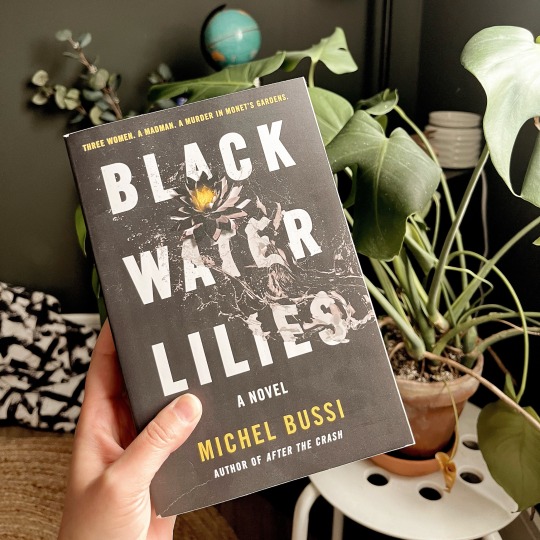
#book community#book photography#bookblr#bookstagram#readers#readers of tumblr#reading community#book recommendation#paskekrim#påskekrim#murder mystery#french novel#french literature
14 notes
·
View notes
Text
French fantasy review: Les flammes de la nuit
I do wonder why I make these posts – about French novels that I do not think were translated in English, reviewing them in English on an English-speaking website… I do know that some French people are lurking around under a mask of Englishness, but still, most people here are those that I guess will never have access to the novels I review… But oh well, I’ll do what I’ll do, as bizarre as it may sound: and what I’ll do is talk about the French fantasy.
I already translated a long time ago some articles written about the French fantasy literature, but here I will share my personal thoughts and favorites when it comes to this genre of fantasy that is considered “foreign” and “exotic” by the simple virtue of… not being written in English. France is the land of literature, and has already bred, nursed and thoroughly exploited and theorized the two genres that gave birth to the fantasy and yet are so hard to translate in English: the merveilleux of fables and epics, the fantastique of 19th century supernatural tales… Why wouldn’t France have fantasy too? The name of the genre stays English, unfortunately, but it has enough echoes and roots within our own féeries and surnaturel to find a place prepared for it since centuries…
Anyway, enough lyrical: let’s get into the meat of the subject, let’s dig to the bone, and I want to begin with “Les flammes de la nuit” (The flames of the night) by Michel Pagel.
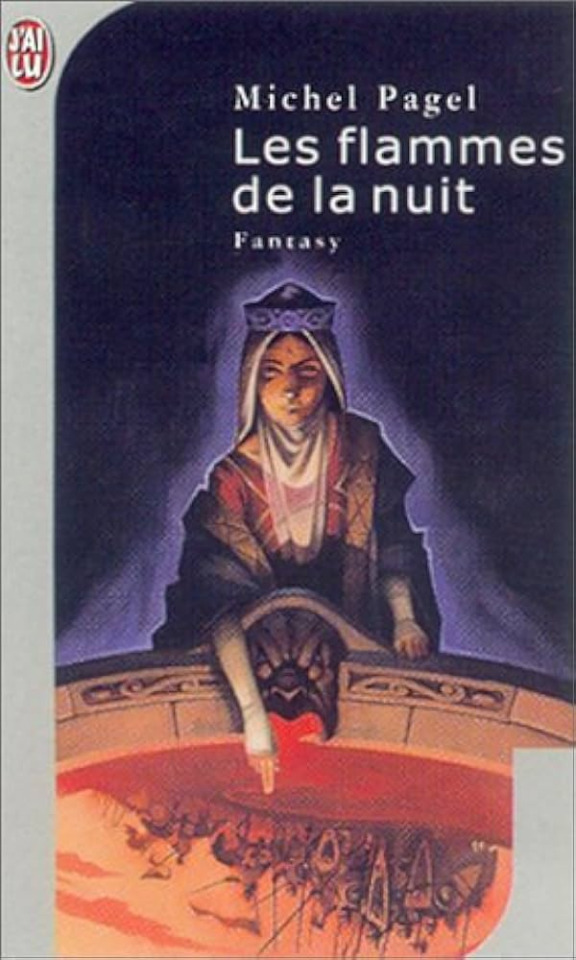
When I picked up this book I was not expecting anything precisely from it, I was just curious. I had only ever heard of Michel Pagel through a huge and dark series of his called “La Comédie Inhumaine” that everybody loved and that was renowned as a dark and violent fantastique, but I never read it. The reason I picked up this book was due to its relationship with fairytales. If you do not know I am REALLY into fairytale stuff, I even have an entire sideblog just to talk about fairytales ( @adarkrainbow ). And this novel was advertised as being a fairytale subversion, so I thought, let’s get into it! [EDIT: I actually also had heard of Michel Pagel through another work of his that now I will definitively read, Le Roi d’Août, a supernatural historical novel that faithfully retells the biography of the king Philippe Auguste… While filling some historical blanks in his life by the intervention and encounter of the supernatural folks hiding within the French landscape.]
Most notably, when I checked briefly online reviews to see if I should get the book, all agreed on a same thing: all said that the book was absolutely great, with wonderful ideas and powerful characters… until the very end which had disappointed everybody (at least at the time the reviews were made, so by the 2000s/early 2010s). As a result I went into this novel saying to myself “Okay, the beginning and middle will be great, the end will be bad, get ready”. And… what a surprise! The ending was not bad at all. A bit confused and rushed but… it was a good ending. Or rather a fitting ending (because it is not a happy or positive one, nor is it a negative one – it is a grandiose, tragic, bittersweet but hopeful ending perfect for the tone of the novel and the project the author set upon himself). If you ask me, all the reviews were wrong – and I had been deceived for the best, since the novel surpassed what I was expecting. Now, I won’t throw the stone, I actually understand why these readers were disappointed with the ending and I’ll explain why (spoiler: it is a question of context and point of view). For now, I’ll simply say that I greatly love this novel which definitively goes into my top French fantasy novels.
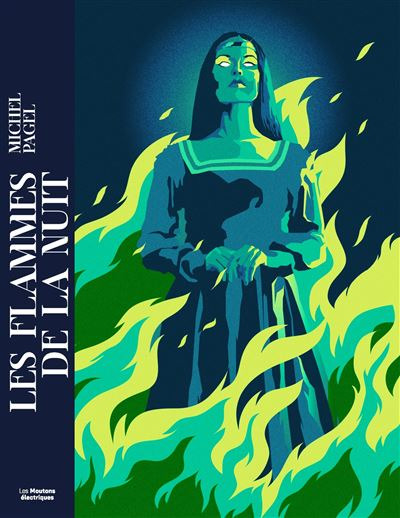
In terms of editions and publications, a few indications… This is one of those typical edition thingies that are so peculiar to France. The novel was originally published as a series of novellas. Four in total, between 1985 and 1987, in the “Anticipations” collection of the Fleuve Noir publishing house (it was still in this era where in France fantasy and sci-fi were sold together as one and the same). Later, the four novellas were collected into one full volume, one novel divided into four parts. This complete volume was published in 2000 (in a small format by the J’ai Lu Poche Fantasy, in a large format by Denoël collection Lunes d'encre), and it is both the version I read and the one most people refer to when talking about “Les flammes de la nuit”. I do not know if the text was edited or slightly rewritten for this new format – I don’t think so, but I have to admit the text felt so much like an early 2000s story I was quite surprised it came from the mid-80s… There’s quite notably the fact the main character is openly bisexual, but hey, the 80s in France were quite a time too… More recently in 2014 Les Moutons Electrique republished the integral in a large format, and then in 2022 in a middle format, proving this novel’s great and enduring success.
[Note: As I am writing this post I made a quick checklist and I just discovered that Michel Pagel actually was the French translator of Neil Gaiman’s Anansi Boys and American Gods, as well as of Gary Gygax’s Monster Manual for D&D… Wow, that was a total surprise – and it does explain some things, I notably see how Neil Gaiman’s writing could have had an influence over this novel…]
Let me briefly set you in the mood the very first pages plunge the reader into… We follow an old man who is travelling on a pilgrimage to a great lake at the center of a medieval kingdom name Fuinör. He isn’t just any old man: it is but one of his masks. He is the Enchanter, a great and powerful wizard as old as the universe itself, a supernatural being known to take many forms, and who can be as much a wild animal of omens as a seducing woman luring knights to an uncertain doom… Once he reaches the great lake, called the Mirror for its still waters form the perfect reflection of the sky and the sun above it, in a great burst of light, the sun disappears… and reappears. But the sun is not golden anymore: it is green. And with the sun everything changed color within Fuinör: the sky is not blue but indigo, the sea is the color of emerald, the trees have blue leaves, human skin is orange… And this is perfectly normal, for in the world of Fuinör, every seven years the sun is reborn above the lake, turning into a different color, and with it everything in the world also changes its hue. And as such, seven year by seven year, the light goes through all the seven colors of the rainbow…
This sets the stage for what “Les flammes de la nuit” is. And it is many, many things, a story which likes the sun of Fuinör undergoes different stages and tones (the serial publication helps this feeling of slow transition and evolution throughout the novel).
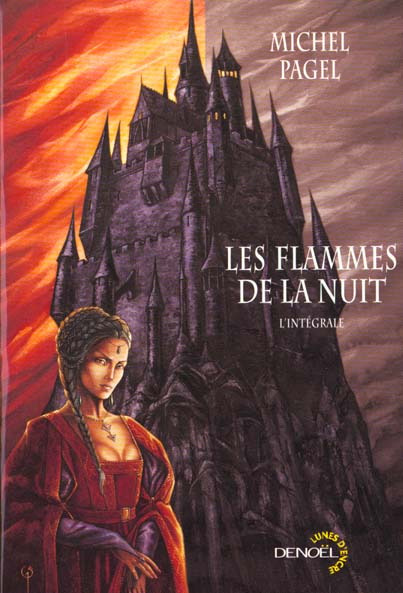
The story opens as an open, cynical and dark parody of fairytales – for the world of Fuinör is a world of stock fairytales. It is a world in which, when the king has a daughter, seven fairies, each for each color of the rainbow, arrive to bless her with all the usual gifts – beauty, grace, singing – while carefully avoiding anything like strength or intelligence, for these are male gifts for those destined to rule. It is a world in which, when the queen gives an heir to her king (and there is always only one king and one queen), she must die in labor – and if she happens to survive… then the royal doctor must prepare a certain powder to make sure the queen respects the tradition. It is a world where barons often declare themselves vile rebels and wicked usurpers and try to overthrow the high king… but they are always defeated because the law claims there can only be one rebellion at a time, and each baron must warn in advance the king and let him decide how, when and where he wants to do the battle. It is a world where there is a land for each thing – quite literally. Fuinör is divided into different “countries” each dedicated to a specific area: there is a land of Hunting, where the hunts take place, and any hunting elsewhere is outlawed. There is a land for War, and nobody would ever think of waging war elsewhere than there. There is a land for Love, and all love and romance and sex can only take place within its boundaries. Such as the laws, and the customs, and the traditions, and they have always been since the beginning of time…
Fuinör is a mix of all the classical fairytales and the traditional medieval romance and Arthurian tales – but all taken to an extreme. Fuinör is a world stuck in an endless cycle of loops, where the events all repeat themselves in the same way with predictable end, where everyone is given a specific role and fate since birth, where everything is stuck under an order that has been decided by ominous gods a long time ago, and where no surprise and no disorder can ever happen. The brave knights in shining armor always win the heart of princesses, the high king is always victorious of anyone that tries to take his throne – and if someone ever does, THEY are the rightful high king and the other is the usurper – and the peasants… well who cares, they don’t count, they’re not even considered human, they are just here to work and be background props.
But things will change… Things will change thanks to the Enchanter, who decides that when the new princess of the kingdom is born, little Rowena, she shall receive a gift no other princess ever received… the gift of intelligence. An intelligence that will allow her to understand the absurd logic of her world, and use the sclerosis of archetypes and the rigidity of millennia-old customs to her advantage. An intelligence that will make her greater and more powerful than anyone – an intelligence that will threaten the very existence of Fuinör… Thus is the beginning of “Les Flammes de la Nuit”.
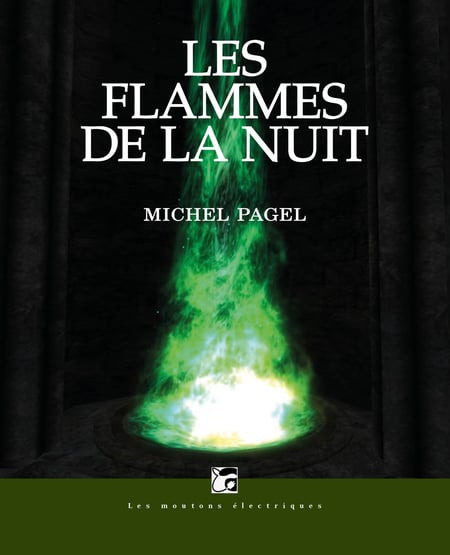
The beginning of the novel, Rowena’s own youth and story, is clearly designed to deconstruct all the archetypes, stereotypes and point out all the bad side of both the generic fairytale (especially Disney’s version of fairytales – the novel is filled with jabs at Disney and the “Americanized” fairytale, the seven fairies being basically Disney’s fairy godmothers mixed with Glinda from The Wizard of Oz MGM movie) and of the Arthurian romance as we know it today. It does not mean Michel Pagel hates those genres, quite the contrary! This book heavily pays homage to both domain, in which Pagel has clearly a great interest. In fact, this book is much more “medieval romance/Arthurian epic” than fairytale in tone, and while anybody who saw the Disney movies or read Perrault will get the fairytale references, I do believe someone with zero knowledge of the Arthuriana will miss a LOT of cultural jokes and clever references in this text. From the get go the Enchanter is clearly supposed to be inspired by Merlin from the Arthurian myth – but not the Disneyified, Americanized Merlin. The original Merlin, Myrddinn, the mythical, legendary, ambiguous and terrifying entity that exists beyond shapes and times and manipulates fate as he pleases… In a similar way, if you haven’t done any research on the evolution of the legend of Avalon you won’t get how twisted and cool the climax within the domain of the Fairies is… But I won’t reveal too much spoilers.
But loving doesn’t mean being uncritical, and this book is clearly the result of Michel Pagel thinking about what he adores, and highlighting in an entertaining way all that is wrong with those classical tales. The first part of the story is centered around Rowena, this intelligent and daring girl born within a world of the worst fairytale stereotypes and outdated medieval chivalry. And as she grows up she gets to explore what others were too afraid to explore, she understands what nobody understood, she gains power nobody had access to before… all the while suffering from what her world really is: unfair, classicist, sexist, misogynistic and abusive. And this begins already the bittersweet tone of the novel. At the same time we have a very funny parody that enjoys dark humor and plays all the code of the traditional “fractured fairytale”, and yet it alternates with very sad and dark moments where Rowena is confronted with the cruelties of such a universe and understands why being an intelligent girl in a world where women are to be submissive and stupid can be dangerous. But all is in fact set and prepared for her own fate, prepared by the Enchanter in person: for Rowena will become… the Witch.
And of course I love this, because who doesn’t get to love a dark retelling of fairytales, who doesn’t like a faithful retelling of medieval epics with an acute sense of modern values clashing with outdated morals, who doesn’t get to love the story of how a girl became a witch-queen? But… I think this is where the “fracture” with a certain part of the audience happened. I will return to the reviews I talked about above: many people thought the ending was worthless or were betrayed by it. Having read the novel I understand why they felt that: in their own words, they were sold and expected a feminist retelling of fairytales about breaking conventions and stereotypes. They were sold the story of a girl being a hero, and the old fairytale clichés being mercilessly mocked and denounced and beaten upon. And that was it for them. As such, yes, the ending probably disappointed them… Because it isn’t what the story is about.
It is made clear in the beginning of the story: being a Witch is not a pleasant thing. It is not a power fantasy. It might look like it, and Rowena uses it as such, but we are clearly warned that a Witch is still an unpleasant, dangerous and sometimes disgusting existence which will require suffering, both inflicted by the Witch and received by her. It is in such a path Rowena sets herself upon – and this is part of a greater scope of things. Rowena is the main character of the novel, but she is part of a wider plot by the Enchanter. The Enchanter wants to break the endless, frozen cycle of Fuinör. He wants to destroy those paralyzing traditions and this unnatural order. He wants to plunge back the world into chaos – a benevolent, needed, positive chaos, but a chaos still. And one of the very strong messages of this tale is: a need to go beyond Manicheism. To go beyond simplistic duality or archetypal characters. What Rowena, and the Enchanter, and others later, bring is complexity. The entire point of the novel is to go beyond the idea that there is all good and all bad, clear cut good and evil, black and white. As such, slowly as the cosmic battle wages on, as the Tradition and the Divine Law unravel, the characters grow into shades of gray as all their values, their positions and their allegiances are redefined, put to test or exposed, as the very machine of the universe starts to be pulled apart. Characters that start out as nice and lovable heroes turn into selfish villains. Characters that appear as flawed jerks and unsympathetic narrators learn from their mistake and grow heroic and wise. Courageous warriors grow into cowards, figures of sanity become mad, and this entire novel is the story of one huge revolution where everything changes: moralities, social hierarchies, laws of justice, and even genders! (The novel notably features an exploration of non-binary genders through one specific character – or three depending on how you count it – not including the various shapeshifting of the supernatural entities, which again helps make it resonate with a modern audience despite being around for quite a long time)
As such, no, this story is not a feminist power fantasy, and those that go in expecting this will be disappointed. It is a much, much larger and complex story about an entire world, about this fictional place born out of the classic fairytales and the medieval romances and the Arthuriana, and how this thing is confronted with its own choice of “evolve or die”. And this is still a very powerful and admirable story, which at the same plays subverts tropes, while also playing many clichés and stereotypes straight, but with a clear knowledge of this. Some people in the reviews said they were disappointed that ultimately, it seemed that Michel Pagel, in trying to break down and denounce clichés, ended up himself reasserting those same clichés. And I honestly do not think it is the case – as the novel is rather a strong defense of “We should get rid of all clichés and stereotypes, because they’re always going to trap us, no matter on which side they are”. But again, I can’t reveal too much without spoiling this long modern epic.

A good example of why for example this novel isn’t a pure “feminist fantasy” as many believed: Rowena is not the only main character. There’s another one, a “male counterpart” so to speak of the Witch-Queen in training. A character who doesn’t really have a name (well he has one but it is kind of a spoiler domain), and whose own backstory forms the second part of the novel (or the second novella of the series). A character who lives in a different part of Fuinör, and also should have been trapped in a cycle of millennia-old rituals and binding traditions and unfair customs, but whose fate changes completely due to the interventions of the Witch and the Enchanter… Except that, whereas with Rowena we had a bittersweet parody of Disney movies and traditional fairytales, with this second character we rather explore a deconstruction and attack of a different type of folktales. There is notably a brutal takedown of the whole “Journey of the Hero” system and the “Monomyth” idea. And I don’t say “brutal” lightly: this part of the novel is very, very brutal, physically speaking. Because this second main character is the helpful companion on the road in fairytales that helps the hero get the girl while himself having nothing. He is also the stock archetype of the Fool doomed to make mistakes and be ridiculed or punished. And he is the False Pretender, the False Hero of fairytales here to put in value the True Hero… Except we are told the story through his point of view. Except he is not evil, he is a guy who is trying his best but is put in an unfair position and only gets endless bullying. Except the True Hero doesn’t seem to be deserving of his position, and the question is raised of “Maybe the other guy should have been the Hero”… But here we shift into a fantasy version of what Terry Gilliam’s “Brazil” was and we fully explore the magical dystopia that is Fuinör.
Overall I do have to say… I think so far the closest thing I have seen in terms of overall tone and ambiance, in the English-speaking world, to compare these works… would be Dimension 20’s season “Neverafter”. Both works deal with a very funny parody but also very dark twisting of fairytales and folktales. Both deal with characters being abused and going through horrors at the end of great cosmic powers and otherworldly narrators. Both tread between comedy and horror ; and both deal with the protagonists’ attempt at breaking endless cycles set upon by fairies (because, in both Pagel’s novel and Dimension 20, the fairies are one of the numerous antagonists as the ruthless and terrifying enforcers of the “laws of fairytales” that get everybody stuck in their roles and functions). Of course, the two works are very different beyond that… But there is a common bone.
A final element I need to add so that you get a full understanding of this novel: Michel Pagel placed his book under the patronage of Shakespeare. And if the fact every part opens with a quote from one of Shakespeare’s play, from Hamlet to Macbeth passing by Romeo and Juliet, King Lear and more, wasn’t enough, anyone versed in Shakespearian studies will see how among the many archetypes and stock tropes of the novel, those of Shakespeare also regularly pop up. Someone once wrote that this novel started out as a fairytale parody, but slowly evolved into a Shakespearian tragedy, and I cannot agree more. It does start out as a dark and morbid but entertaining parody – and then things get really brutal, really violent, really sad, really serious, and we enter a terrible and dreary fantasy, but still very poetic and very human, that moves towards a universe where all of Shakespeare’s greatest cruelties fit right at home. The novel most notably has a lot, a LOT of fun exploring the Shakespearian archetype of the “Fool”. There’s almost two handfuls of characters that each is meant to explore a different aspect of the Shakespearian Fool, each expressing a difference nuance of it (the famous non-binary character is one of them, paying homage to the typical gender-plays and gender-questioning within Shakespeare’s plays) – and I am glad to be a Shakespeare enjoyer when reading this novel because again, a random person with zero Shakespeare knowledge would miss a lot of things. (Which again is I believe the reason the Internet reviews attacked this novel, there is a certain degree of medieval and literary knowledge needed to get the parts of this novel that pay homage to the older texts and more ancient roots of the clichéd, Disneyified myths we have today… Without it the novel can still be read, but it might seem much weirder and bleaker than it truly is)
Finally a flaw, because there needs to be a flaw in every review, it can’t all be glowing: I do admit that of the four parts composing this novel, the fourth one did felt unbalanced. Notably the author seemed to spend too much time, description and effort on characters barely introduced (which at the ending climax of a story is not good), and not enough on the characters we were following since the very beginning… But I will blame that on the fact the fourth part was originally meant to be an independent novella read one year after the last part was published. I do believe that, while putting the full series in one volume is quite convenient if you want to buy something to read over holidays, it does make one feel a bit tired by the end since you literally absorb four years of writing into one go… So, my advice would be to enjoy this book by making pauses between each part, to not do an “overdose” that would be too abrupt.
Or two flaw, I feel generous: when it comes to the second part, it felt a tad bit repetitive. A tad bit too much repetitive. I get that we are supposed to have a hopeful character that is trying his best to make things work and obtain what he wishes for, and we are supposed to fully get the injustice of the situation and the hardness of this world… But precisely because of how it explores casual violence and vicious brutality, the repetitiveness is felt more. It’s a type of “break the cutie” (who isn’t here so much a “cutie” as a morally neutral human being) scenario, and I am not well placed to say if the author did just enough or too much.
[Edit: I do love how the original covers for the 80s series tried their best to make it seem like a full horror series... when it is not]

#fantasy novel#fantasy#book review#fantasy book#french literature#french novel#michel pagel#les flammes de la nuit#french fantasy#medieval romance#dark fairytale#neverafter#fairytale parody#deconstruction#subversion#shakespearian#shakespeare
15 notes
·
View notes
Text
Richie Hofmann - French Novel
You were my second lover.
You had dark eyes and hair,
like a painting of a man.
We lay on our stomachs reading books in your bed.
I e-mailed my professor. I will be absent
from French Novel due to sickness. You put on
some piano music. Even though
it was winter, we had to keep
the window open day and night, the room was so hot, the air so dry
it made our noses bleed.
With boots we trekked through slush for a bottle of red wine
we weren’t allowed to buy, our shirts unbuttoned
under our winter coats.
The French language distinguishes
between the second
of two and the second
of many. Of course
we’d have other lovers. Snow fell in our hair.
You were my second lover.
Another way of saying this:
you were the other,
not another.
3 notes
·
View notes
Text

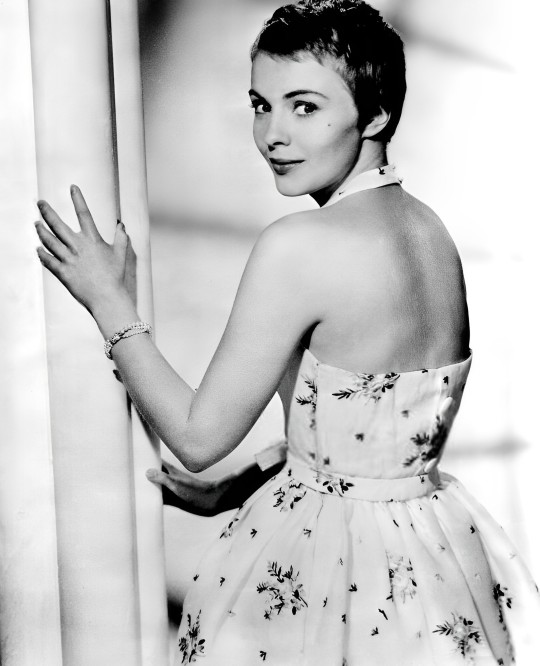


❤️❤️❤️❤️❤️
The actress Jean Seberg, wears one of the dresses created by Hubert de Givenchy for the film "Bonjour Tristesse" adapted from the novel by Françoise Sagan, and directed by Otto Preminger in 1958.
L'actrice Jean Seberg, porte l'une des robes créée par Hubert de Givenchy pour le film "Bonjour Tristesse" adapté du roman de Françoise Sagan, et réalisé par Otto Preminger en 1958.
Jean Seberg in publicity pictures for Bonjour Tristesse (Otto Preminger, 1958) © Everett Collection
#jean seberg#american actress#hubert de givenchy#french designer#french style#françoise sagan#otto preminger#1958#everett collection#bonjour tristesse#french novel#roman français#style 50s
25 notes
·
View notes
Link
💣BREAKING NEWS 🔥 Un immense privilège de voir mon nouveau roman ARIZONA STARS 🦎 à la UNE du célèbre FRENCH QUARTER MAGAZINE de LAS VEGAS❤️😎🤩👄
Interview publiée en version bilingue français / anglais
#lasvegas#frenchquartermagazine#rivierabeach#usa#normandy#normandie#arizona#usamagazines#books & libraries#booksrelease#french novel#french novelist#romancière#romancière française#saga#intrigue#plot#outcome#successful outcome#éditions maïa#histoire vraie#based on a true story#sortie de roman#deauville#nevada#moulin rouge#paris france#las vegas strip#interview#bestseller
6 notes
·
View notes
Text
One of my all time favorite lines ever written
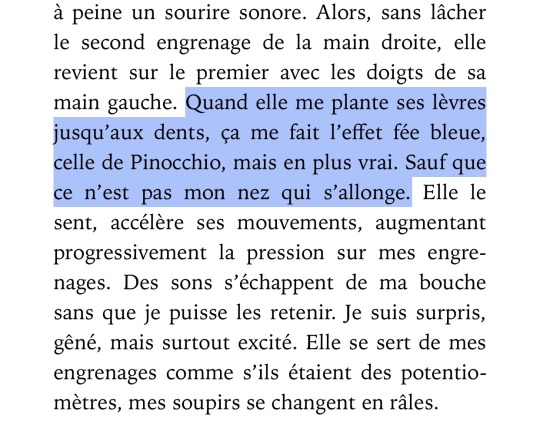
#la mécanique du cœur#favorite lines#books#French novel#French#learning french#langblr#french langblr#probably the most poetic way to describe a hard on#booknerd#jack and the cuckoo clock heart
4 notes
·
View notes
Text
POURQUOI J'APPRENDS QU'AUJOURD'HUI QUE LA SERIE QUI AVAIT ETE ARRETEE A CAUSE DE LA MORT D'UN DES DEUX AUTEURS A UN POINT COMMUN AVEC L'UNE DE MES AUTRES SERIES PREFEREES A SAVOIR L'ECRIVAIN PIERRE BOTTERO AAAAAAAAAAH JE COMPRENDS MIEUX POURQUOI **** EST MORTE AINSI DANS LE TOME 8 ET AAAAAAH WTF JE SUIS TRISTE MTN 😭😭😭😭😭😭

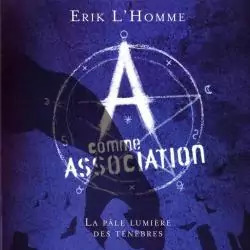

#EWILAN#ewilan quest#ewilan#la quête d'ewilan#pierre bottero#erik l'homme#A comme association#french novel#french teen novel
0 notes
Text
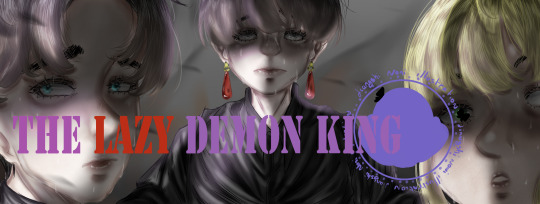
Lazy demon king revient!
Comme dit auparavant, 2 chapitres ont été mis pour m'excuser de tout ce temps d'attente
Pour l'illustration, j'aimerai attendre avant de la poster pour ne pas trop vous spoil sur ce qui va arriver mais j'espère que ce qui liront aimerons cette illustration 💜
merci d'avoir attendue et profitez de votre lecture
chapitre 13 volume 1 : "Mon ending"
chapitre 1 volume 2 : Solis
#artists on tumblr#artwork#digital aritst#digitalillustration#female artists#small artist#art#digitalart#illustration#writting#writter#novel#French novel#livres#nouveau chapitre#realease#TLDK#neovel
0 notes
Text
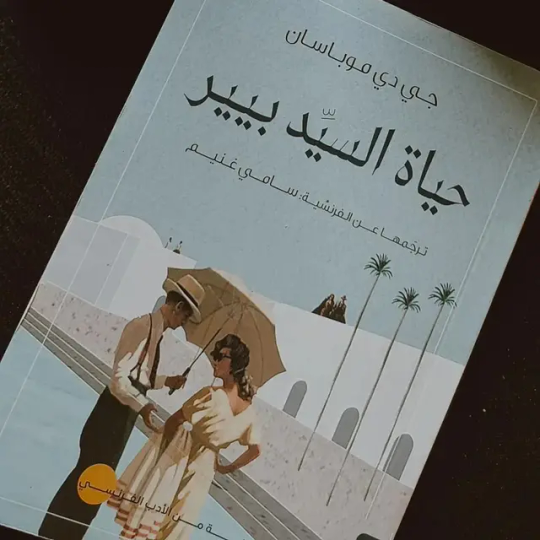

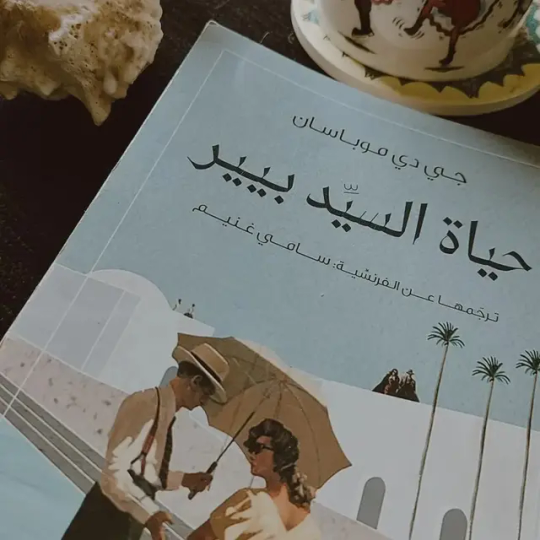

حياة السيد بيير.
جي دي موباسان .
روايه من الادب الفرنسى.
"حياة السيد بيير و اخيه جان غامضه فبينهم اختلافات كثيره .. فهل الاسرار التى سوف يتم اكتشافها ستسبب فى تقاربهم ام لا .. و ماذا تخفى والدتهم؟"
اقتباسات:
instagram
"إن الحياة قاسية.. قاسية جدا.. تعطى الإنسان قدرا من السعادة حتى اذا تخيل أنها دائمه له.. لا تلبث ان تسحب البساط من تحت قدميه!!"
#تحدى_حمله_اصدقاء_الكتاب
#قراءه_كتاب_٣٠٢٣
1 note
·
View note
Text
à 17 ans, lorsque j'étais en pleine période de deuil après avoir perdu un être cher, j'ai écrit une petite histoire qui m'a permis d'évacuer ma tristesse.
disponible sur le site thebookedition.com au format papier, je vous invite à lire la triste histoire de Domino, un petit clown en bois forcé de travailler dans un grand cirque, dont il est la vedette, la bête de foire.
#my writing#roman#français#book#edition#littérature#french novel#roman français#le livre de poche#lecture#livres et lecture#tristesse#deuil#autoedition#thebookedition#french#littérature francophone#littérature française
1 note
·
View note
Text

Marguerite Duras, from The Lover
Text ID: to devour and be devoured,
15K notes
·
View notes
Text
Some times ago Neil Gaiman posted on his Tumblr blog about a project he had of, if I recall correctly, a movie adaptation of “Journey to the West”. One of the reasons he gave as to why he gave up on the project was that he realized that this work didn’t need to be retold by an European - I do not have the exact quote, I am just saying things out of memory. This post, and the topic of “Should non-Chinese people make fictional works based on Journey to the West?” made me think back to a book that would have made me answer “Yes, non-Chinese people can retell Journey to the West”. And this book would have made me answer that - if I had been asked - because it is such a beautiful and funny book. I even hesitated to share about it here because this book is truly one of my little treasures. I read it when I was a pre-teen and it marked me deeply and if I were ever to lost it I’d buy it again because I couldn’t imagine having a library and not having this book with me. And it isn’t just teenage nostalgia speaking because, re-reading it as an adult, I still find new entertainments and fascinating meanings and implications that I completely missed as a young kid not knowing much.
I had a bad literature school-teacher at the time and when she heard about me reading it, she answered that it wasn’t good for young minds to read these kind of works because they “mixed the genres” and blurred the lines of the categories of literature - she much preferred that kids would have much more categorized works that clearly and easily fit into one genre or the other. That’s the kind of bad literature teacher you’ll probably all recognize somehow, and this already places this book as one of the things these people do not like. But to take this book merely to spite those that wrongly understand literature would be a shame, because this book deserves to be loved on its own for the shere amount of work, poetry and love that its own author put into it.
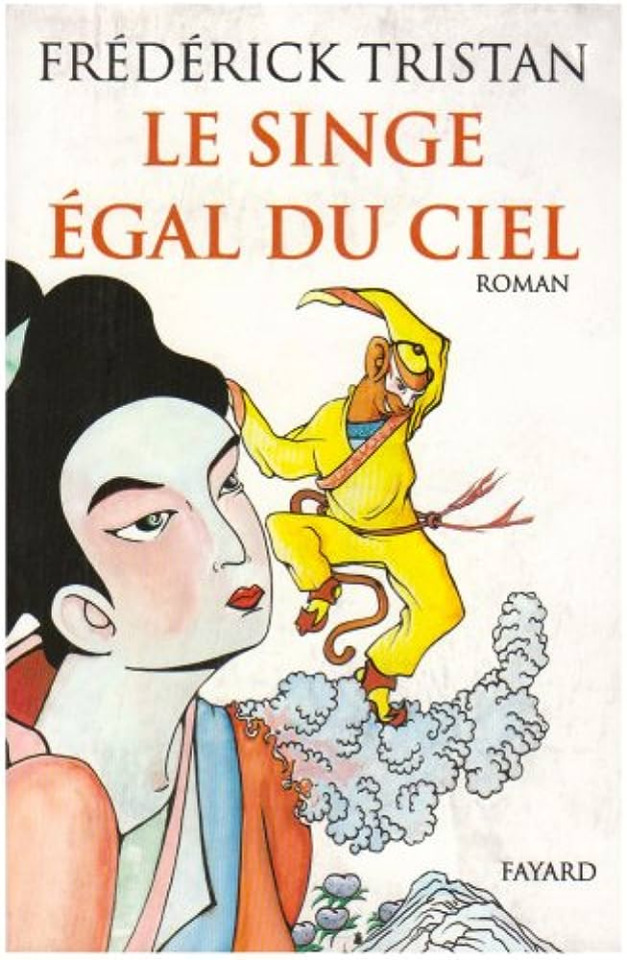
This book is probably the greatest French reimagination of “Journey to the West” I can think of - it is “Le Singe Egal du Ciel”, “The Monkey Equal to the Sky”, by Frédérick Tristan, originally published in 1972, but still printed to this day. And before the Journey to the West purist start attacking me like rabid dogs, I insist on the term “reimagining”. It isn’t an adaptation of the work, and it is not a question of being a faithful translation of the original epic. It reimagines, re-arranges, re-creates the Journey to the West plot and characters into a story that is, on its structure and foundations, identical, and yet couldn’t be more different than it. And it is a good thing, because it is the power and strength of this book.
I heard that Tristan’s books were translated in English - which doesn’t surprise me given he is one of the great French authors of the late 20th century - but since I do not know if this specific book was translated, and under which title, I’ll use the French title translated into English, The Monkey Equal to the Sky. What is “The Monkey Equal to the Sky”? It is, as I said, Journey to the West retold, but condensed, trimmed down and cut short to fit into one nice fantasy novel of forty-two chapters. Some of you hearing that might feel some sort of self-righteous nausea, saying “If they cut down anything from the original plotline, it is not worth it, better read the full original”. But again this would miss the point of this wonderful book: to someone with bare knowledge or no knowledge of the original epic, it is a great introduction and first discovery, by having a shortened story centered around the key characters and events, while also being different enough so that when said nocive in ancient literature gets to read the original epic, they’ll have an entirely new world to discover. But to the other side, to those who are very familiar with Journey to the West, it will be a fun entertainment and deforming mirror, as Frédérick Tristan truly plays with the original text, creating a game of correspondances and analogies, uniting several different characters into one, inter-connecting strongly the “before” and “after” parts surrounding Sun Wukong’s imprisonment under the mountain, and ultimately making it even more obvious than the greatest monkey of them all is the main character and protagonist of the tale.
Because this is what Tristan wanted to do before all: tell the story of Wukong, all about Wukong, as the protagonist, hero, antagonist and villain of his own tale all at once. The story might be changed, but trust me, the character of Wukong isn’t in the least, because this book is filled with the spirit of Journey to the West and the Monkey King, if not with the detail. I will tell you already the very bold move Tristan did, to really make this story even more about Wukong than it was originally: in Tristan’s novel, there is no Tripitaka. The monk that is charged with fetching the sacred texts in India and who is surrounded by three disciples is rather... Sun Wukong himself, or rather his fictional equivalent here, The Monkey-Equal-to-the-Sky (also undergoing his religious name, Aware-of-the-Vacuity, Conscient-de-la-Vacuité). It might seem like an insane thing to do, but it WORKS. Of course, those that will be looking for some of the readings of the epic - such as a dissection, exploration and study of the human soul, psyche and personality between the various impulses, emotions and vices, throughout the metaphorical characters of Tripitaka and his disciples - will be disappointed because Tristan’s novel is not a psychological one. But instead, what you have is a careful balance between existential horror and a cosmic farce - some sort of impossible mix of Lovecraft’s cosmic dread mixed with the world-questioning humor of Good Omens, and even then the comparison is a very poor one missing out on the very peculiar, unique and poetic feel of this novel. It is about this monkey, who is all powerful and yet constantly bound and chained by something, it is this monkey that clearly is the voice of reason of the world and yet acts like a madman, this monkey that is a living paradox - and the story is about how his very existence throws an ordered world into chaos and forces it to be rebuilt and undergo a full renewal. It is the story of how, by merely existing, this character that does both heroic deed and monstrous actions, challenges the very notions of supreme powers, of existence, and of reality. It is a buffoonic Shakespearian comedy where the trickster-monkey mocks, beats up and scams everyone and everything, it is an apocalyptic work where we see what happens when something unexpected and that should not exist destroys the very foundations of the world, and it is a philosophical and religious investigation as the monkey searches for, studies, explores and quests for the powers, the meanings, the morals and the truths behind religion, absolute purity, true virtue, and the world.
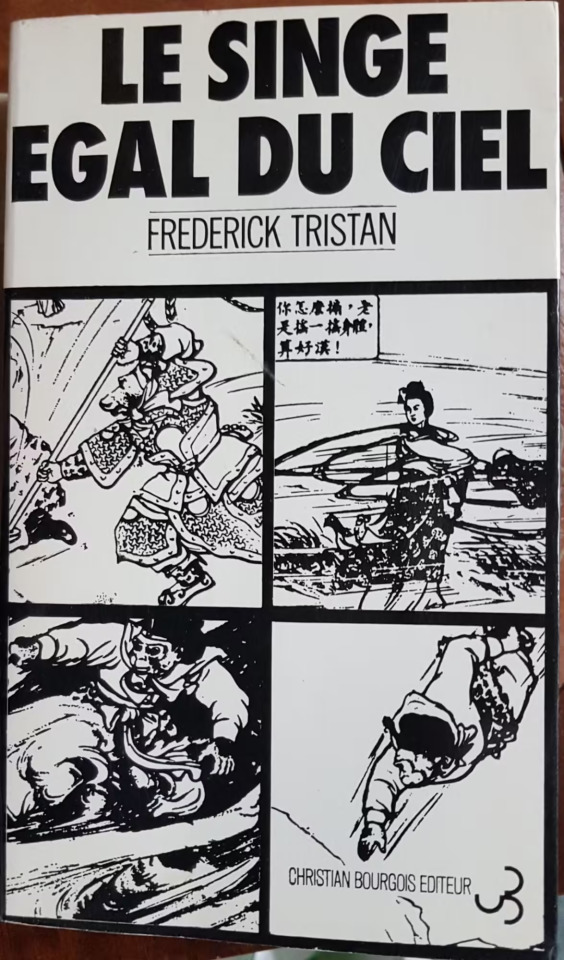
It sounds like a LOT for a novel that is actually a shortened and condensed version of Journey to the West, but that’s the secret: by mixing various characters into new ones, by changing slightly the focus of the story, by giving new angles to some episodes and scenes, Tristan opens up a whole new space and vast expanses of literary terrain on which he adds tons of fascinating content and fresh details to retell the story with new meanings. Frédérick Tristan himself put a Warning in his text as a foreword, explaining the various inspirations of his work so that people did not mistook his novel for a mere adaptation of Journey to the West: because beyond the great Chinese novel we all know, he also took elements from other texts that also told of the legend of Sun Wukong (Journey to the West merely being the most famous and most complete of the various tellings of this ancestral legends), as well as various stylistic ingredients and poetic tones from the various historical translations of the work in Europe - such as the first French and British translations. In the same foreword, Tristan does spell out his intentions of completely reversing the original meaning of the novel by making Sun Wukong take the place of Tripitaka during the pilgrimage to India.
And even beyond his extensive researches surrounding the figure of Sun Wukong himself, Tristan also slid in his novel various elements from both European and Asian traditions. European because he places here and there subtle references to European fairytale structures or old European myths (though I have to say they were subtle enough that I didn’t notice them until it was pointed out to me). As for the Asian inspiration, this allows me to break down another of the arguments people who do not know about about Frédérick Tristan might raise: what does an old white French dude knows about China anyway? As it turns out, a lot, and that’s not just his obsession with the Sun Wukong legend. Frédérick Tristan lived from the late sixties to the mid-eighties half of the time in Eastern and South-East Asia. He was at the time not a yet recognized author, but a mere specalist of the textile industry, forced by his father to inherit the textile business of the family against his son’s poetic and literary aspirations. His positions led him to work on official business matters in China, Cambodia, Vietnam and Laos - and during his trips, visits and stays there he became enamored and fascinating with their history and culture. China most of all became his main dream and subject of study: “The Monkey Equal to the Sky” is but the first of a series of six “Chinese novels” each one taking inspirations from various elements of Ancient China. Sometimes he retells and weaves stories based on Chinese myths, like with “The Monkey Equal to the Sky”, whereas other times he rather explores various religious and philosophical aspects of China through the means of fiction. In one he recreates the koan genre in the rules of the art, in another he proposes a fictional exploration of the roots and teachings of taoism, and in yet another novel he pays homage to the works and style of Pu Songling.
And if he knows so much about China, it isn’t just because he loves to write stories about it - he also published serious, profesionnal, recognized works about Ancient China. His most famous work being “Houng, les sociétés secrètes chinoises”, an essay about secret societies in China centered around the rites and practices of the Tiandihui. And his historical and cultural knowledge of Ancient China, its philosophies, its literature and its secret societies helped him recreate another semi-historical semi-mythical China for “Journey to the West” or rather an anti-Journey-to-the-West, to be played in.
I could speak much more of Frédérick Tristan, of his work, and of the beauty of this novel, but I will merely say that, if you enjoyed Journey Through the West, and enjoyed its characters, you will definitively find Tristan’s novel very entertaining. And if you ever have the chance to read it in French, do so, because - again - I do not know if an English translation is available, and if it is I cannot attest of its quality since I never read it, but I hope the brilliantness and fun of the text will be carried on throughout the language barrier.
#journey through the west#sun wukong#frédérick tristan#the monkey equal to the sky#novel#china#ancient china#french literature#my favorite books#books to be read at least once in your life#french novel
37 notes
·
View notes
Text
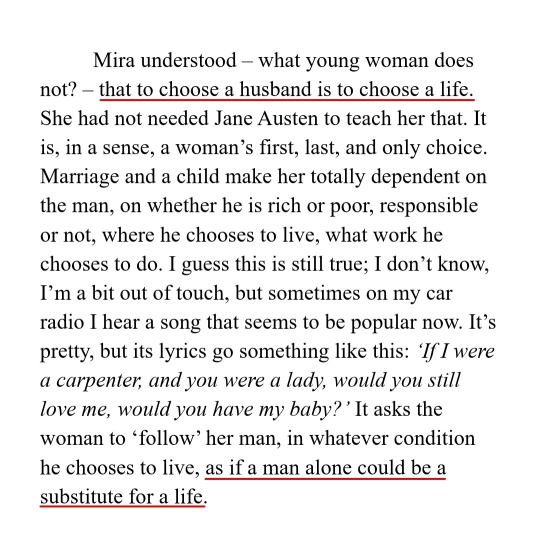
Marilyn French, The Women's Room (1977)
#this novel is going to destroy me and i'm only 47 pages in#marilyn french#the women's room#literature#feminist literature#second wave feminism
533 notes
·
View notes
Text

the sands of time is a fantasy interactive fiction where you play as the mage of a small provincial town who, in the process of investigating into strange magical phenomena, finds themselves embroiled in a far-reaching political intrigue with potentially deadly consequences. and ghosts.
themes/tags : intrigue, fantasy, effects of time, power, magic, ghosts

You are a mage who, after being forced to flee from the capital for a crime you may or may not have committed, has taken refuge in Kemorlen, a small, unremarkable town ideal for keeping out of the political reaches of the Illyosian Empire. But when an apparently straightforward investigation into bizarre magical phenomena forces you into conflict with figures from your past and powerful forces that care little for you, how will you navigate through the oncoming storm that shatters your fragile calm ?
The continent of Aiolos has been dominated by the Illyosian Empire, with its back-stabbing nobles and complex court politics, for generations. Yet their hold is beginning to fray, and its rulers will do anything to take back their former power, sparking events that quickly spiral far out of their control.
Aiolos is a land at the crossroads of the mortal and spirit realms, where the effects of the underworld are felt keenly, and the delicate balance between mortal and spirit realms is ever on the verge of tipping over.
worldbuilding info

Flee from the capital under dubious circumstances: choose whether you were a spy or scholar when in Melera.
Meet five characters (one male, two female, one nb and one selectable: either male or nb) and choose to pursue romance, friendship, or rivalry.
Navigate a world of complicated politics, spirits that frequently won't stay dead and magic that permeates everyday existence.
Choose your name, pronouns, gender and place of origin.
Pick which area of magic you are strongest in, out of four (warding, enchantment, healing and transmutation).
Try not to get assassinated, arrested or possessed.

detailed character info
Jasper (m) :
A familiar face from your past, and not one that you expected to see again. He's a snarky, obsessive researcher into spirits and, during your time in the capital, your closest companion. After getting caught up in the incident that provoked your rather abrupt exit, you presumed him to be dead, and he you.
Leonora (f) :
The owner of the alchemists shop next door to you in Kemorlen. Despite her saving your life (numerous times) and helping you to create a new life for yourself there, she remains a figure that you know surprisingly little about. She's blunt, impulsive, skilled with a sword, and definitely hiding something. All in all, you don't quite know what to make of her.
Augustine (nb) :
A quiet, unassuming healer who arrived in town shortly after you did. Surprisingly squeamish and possessing a dry sense of humour, they have quickly become indispensable in helping you deal with the everyday magical difficulties of Kemorlen. Their past remains a mystery to you, and you suspect there may be more to them than first appears.
Mira (f) :
A charismatic bard who wanders the roads of Aiolos collecting stories, gold, and animal companions after being exiled from her home kingdom. She seems to attract trouble, but as long as the resulting chaos makes for a good tale she doesn't appear to mind much.
Theodorus (m/nb) :
A spirit with patchy memories and a thirst for revenge after being accidentally brought back from the underworld. They're awkward, restless and struggling to reconstruct a life for themselves in a world where they are supposed to be dead.

demo : here currently 17k words, prologue
release medium : twine & itch.io
rating: 16+
pinterest: here
#interactive fiction#twine if#if wip#interactive novel#twine#if game#interactive game#any spelling mistakes are bc i got my keyboard stuck in french mode so all the keys are in the wrong place#what can i say technology hates me#demo
539 notes
·
View notes
Text
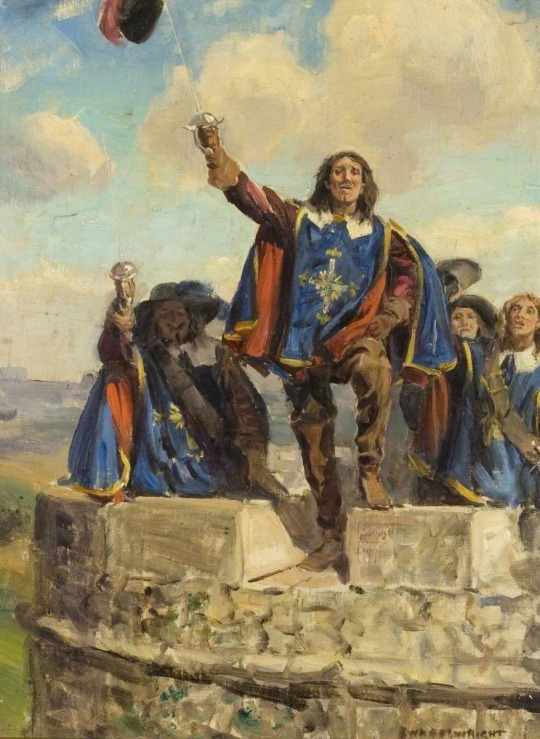
‘Athos placed his hat on the point of his sword and waved’
by Rowland Wheelwright
#athos#three musketeers#the three musketeers#art#rowland wheelwright#musketeers#musketeer#france#french#europe#european#alexandre dumas#history#novel#adventure#swashbuckler#sword#swordsmen#chivalry#ancien regime#ancien régime
201 notes
·
View notes
Text
I experienced pleasure like a future pain.
Annie Ernaux, trans. by Tanya Leslie, from “Simple Passion”
85 notes
·
View notes